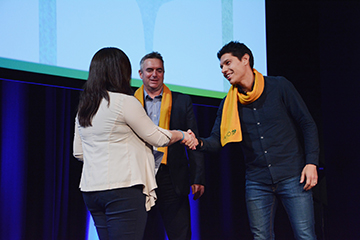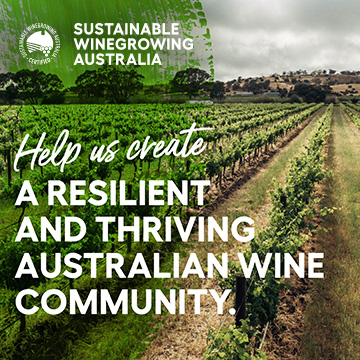New understanding of the importance of proline in dry red wine
Update on AWRI Board appointments
Sustainable Winegrowing Australia news
New approach to white wine protein stabilisation
Have you tuned into Season 2 of AWRI decanted?
Order the latest staff publications online
New understanding of the importance of proline in dry red wine |
|
 |
New research highlighting the influence of proline on the sensory properties of red wine has just been published by the AWRI and collaborators from Deakin University in the Australian Journal of Grape and Wine Research. Proline is the most abundant amino acid in wine and is used a non-carbohydrate sweetener with viscous properties in other foods. A series of experiments was conducted where proline (plus tannins and volatiles) was added to a red wine low in amino acids and to model wines to assess their sensory effects. The key findings were that proline:
The results suggest that proline has a stronger influence on the sensory properties of red wine than previously suspected. The concentration of proline in grapes is related to ripeness and it cannot be utilised by yeast; as such, its concentration can be manipulated through viticultural practices. Proline is easily measured in wine and could be used to target desirable sensory profiles. Analysis of proline in wine is available from Affinity Labs. To find out more, access the full article here or read AWITC poster 87 here. |
Update on AWRI Board appointmentsApplications for the two appointed Director positions on the AWRI Board closed on 20 July. The Nominations Committee is pleased with the number and calibre of applications received and will be interviewing shortlisted applicants in August. An announcement of the successful appointees is expected to be made following the AWRI Board meeting on 20 September and the new appointed Directors will take office in November 2022. Nominations for vacant elected Director positions will open in September 2022, with more details to be provided closer to that date. For more information on any aspect of the AWRI’s Board election and appointment processes, contact AWRI Company Secretary, Shiralee Dodd, on shiralee.dodd@awri.com.au. |
|
Sustainable Winegrowing Australia news |
|
 |
It’s a busy time of the year for the Sustainable Winegrowing Australia team, with membership renewals well underway and the new membership season for 2022/23 now open! For existing members, you will notice a number of enhancements to the workbook – including the ability to add your own notes at every question and upload and store multiple documents as you go. This means everything you need will be safely stored in one place and ready to go if you are taking part in an audit.
If you’ve been considering membership, now is a great time to sign up. You can join directly here or if you’d like some extra support, sign up to receive handy tips with all you need to know to get started. And to hear all the latest program news, register now for the webinar coming up on 11 August, presented by Anna Hooper (Australian Grape & Wine), Rachel Triggs and Drea Hall (Wine Australia) and Dr Mardi Longbottom (AWRI). You can also find out about upcoming certification workshops that are being conducted both online and in-person over the next few months. |
New approach to white wine protein stabilisationA collaborative study looking at alternative approaches to protein stabilisation of white wine by researchers from the University of Adelaide and the AWRI has recently been published in the journal Frontiers in Nutrition. The paper reports chemical and sensory evaluation of ultrafiltration in combination with other treatments to achieve protein stabilisation of a Sauvignon Blanc wine. A combined ultrafiltration/heat/protease treatment removed 59% of protein from the wine, reducing the amount of bentonite needed by 72%, without affecting wine quality or sensory characteristics. The full paper is available open access from: https://www.frontiersin.org/articles/10.3389/fnut.2022.799809/full |
|
Have you tuned into Season 2 of AWRI decanted? |
|
 |
The second season of our podcast AWRI decanted is now well underway! New episodes covering irrigation and non-chemical weed control have already been released, featuring both researchers and practitioners. The easiest way to listen is to subscribe to AWRI decanted in your favourite podcast app – that way you will never miss an episode. Alternatively, you can listen directly from the podcast page on the AWRI website. Upcoming episodes cover topics including soil carbon, regenerative viticulture and automation in vineyards. |
Winter and spring webinarsWinter and spring are peak webinar season! Our 2022 webinars kicked off on 21 July with a session on global wine market trends. New webinars are happening every Thursday, with topics including the National Vintage Report, grapevine viruses, sustainability and recovery from hail coming up over the next few weeks. Visit the AWRI webinar page to register for sessions you are interested in, subscribe to the webinar mailing list to be notified as new webinars become available or visit the AWRI’s YouTube channel to view previous webinar recordings at a time that suits you. |
|
Order the latest staff publications onlineAccessing the latest AWRI publications is easy. Visit the AWRI Publications web page to:
The AWRI’s most recent publications are listed below. 2294 Cowey, G. Ask the AWRI: Effects of COVID-19 on sense of smell. Aust. N.Z. Grapegrower Winemaker (700): 48-50; 2022. 2295 Varela, C., Borneman, A. Molecular approaches to improving our understanding of Brettanomyces physiology. FEMS Yeast Res. foac028: 2022. 2296 Varela, C., Kutyna, D., Curtin, C., Borneman, A. KU80 deletion does not improve homologous recombination in Brettanomyces bruxellensis. Authorea DOI: 10.22541/au.165048566.64316743 v1: 1-14; 2022. 2297 Longbottom, M. Ask the AWRI: Importing new grape varieties. Aust. N.Z. Grapegrower Winemaker (701): 78, 80; 2022. 2298 Dabare, P.R.L., Bachhuka, A., Palms, D., Parkinson-Lawrence, E., Hayball, J.D., Mierczynska, A., Vasilev, K. Surface chemistry mediated albumin adsorption, conformational changes and influence on innate immune responses. Appl. Surf. Sci. 596: 153518; 2022. 2299 Kutyna, D.R., Onetto, C.A., Williams, T.C., Goold, H.D., Paulsen, I.T., Pretorius, I.S., Johnson, D.L. Borneman, A.R. Construction of a synthetic Saccharamyces cerevisiae pan-genome neo-chromosome. Nat. Commun. 13: 3628; 2022. 2300 Gawel, R., Schulkin, A., Espinase Nandorfy, D., Milton, P., Bindon, K. Smith, P.A. Float or sink? Comparing the impacts of flotation and cold settling on the non-volatile composition, taste and mouthfeel of white wines. Wine Vitic. J. 37(3): 16-21; 2022. 2301 Longbottom, M., Robinson, E., Krstic, M. Growing shoots of sustainability. Wine Vitic. J. 37(3): 30-33; 2022. 2302 Dry, P. Alicante Bouschet. Wine Vitic. J. 37(3): p. 63; 2022 2303 Villarreal, P., Villarroel, C.A., O’Donnell, S., Agier, N., Quintero-Galvis, J.F., Pena, T.A., Nespolo, R.F., Fischer, G., Verela, C., Cubillos, F.A. Late Pleistocene-dated divergence between South Hemisphere populations of the non-conventional yeast L. cidri. Environ Microbiol. 1-15. doi: 10.1111/1462-2920.16103 ; 2022. 2304 Wilkes, E., Krstic, M. Introducing Affinity Labs – a new identity for the AWRI’s commercial activities. Aust. N.Z. Grapegrower Winemaker (702): 14; 2022. 2305 Cordingley, B. Ask the AWRI: Techniques to detect Brettanomyces before it’s too late. Aust. N.Z. Grapegrower Winemaker (702): 70-71; 2022. |
|
AcknowledgementsThe AWRI acknowledges support from Australia’s grapegrowers and winemakers through their investment body, Wine Australia, with matching funds from the Australian Government. The AWRI is a member of the Wine Innovation Cluster in Adelaide, South Australia. |
|

